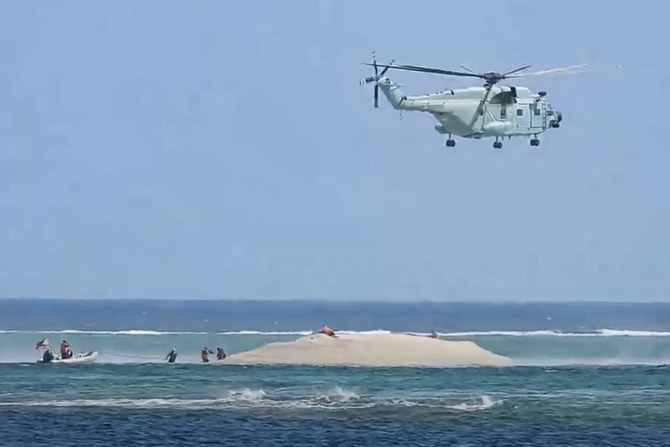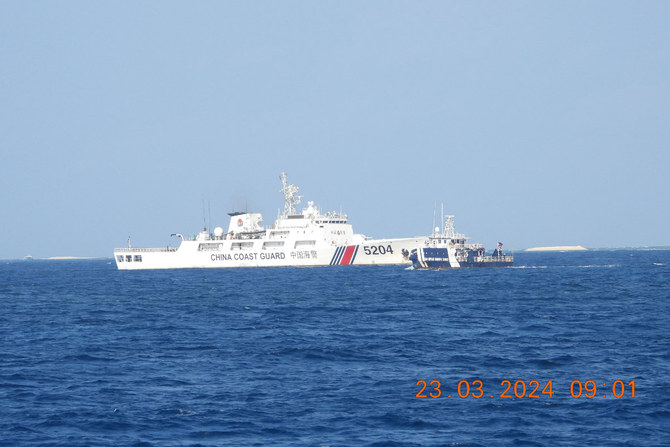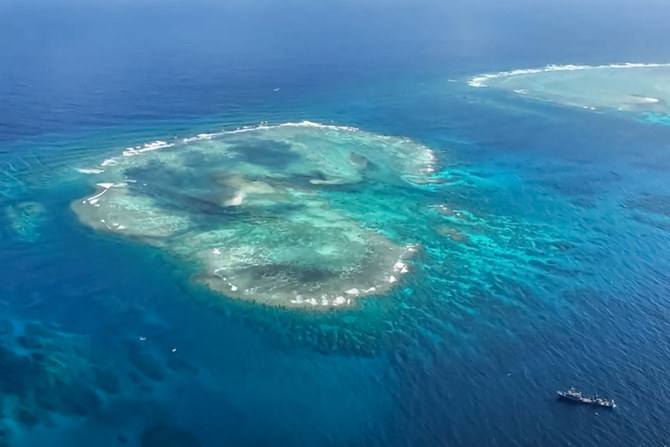MANILA: The Philippine president said Thursday that his government would take action against what he called dangerous attacks by the Chinese coast guard and suspected militia ships in the disputed South China Sea, saying “Filipinos do not yield.”
Ferdinand Marcos Jr. did not provide details of the actions his government would take in the succeeding weeks but said these would be “proportionate, deliberate and reasonable in the face of the open, unabating, and illegal, coercive, aggressive and dangerous attacks by agents of the China coast guard and Chinese maritime militia.”
“We seek no conflict with any nation, more so nations that purport and claim to be our friends but we will not be cowed into silence, submission, or subservience,” Marcos wrote on X, formerly Twitter.
Marcos’s warning is the latest sign of the escalating disputes between China and the Philippines in the contested waters that have caused minor collisions between the coast guard and other vessels of the rival claimant nations, sparked a war of words and strained relations.
China and the Philippines, along with Vietnam, Malaysia, Taiwan and Brunei, have overlapping claims in the resource-rich and busy waterway, where a bulk of the world’s commerce and oil transits.
Chinese officials in Manila or Beijing did not immediately respond to Marcos’s public warning, which he issued during Holy Week — one of the most sacred religious periods in the largely Roman Catholic nation.
China’s defense ministry accused the Philippines of escalating the South China Sea disputes by undertaking provocative moves and spreading “misinformation to mislead the international community.”
“It is straying further down a dangerous path,” Senior Col. Wu Qian, the Chinese defense ministry’s top spokesperson, said in a statement issued Thursday by the Chinese Embassy in Manila.
Both China and the Philippines said they were acting to protect their sovereignty. Wu said China remained “committed to properly managing maritime differences,” while Marcos said he had been in touch with international allies who had offered to help the Philippines.
Marcos said he issued his statement after meeting top Philippine defense and national security officials, who submitted their recommendations. These include the use of faster military vessels instead of chartered civilian boats when the Philippine navy delivers a new batch of personnel and supplies to the disputed Second Thomas Shoal, two Philippine security officials said.
The shoal, the site of frequent hostilities since last year, has been occupied by a small Philippine naval contingent but surrounded by the Chinese coast guard and other vessels in a decades-long territorial standoff.
It’s unclear if Marcos approved that recommendation. The two Philippine officials separately spoke to The Associated Press on condition of anonymity because of a lack of authority to discuss the issue publicly.
In the latest hostilities on Saturday, the Chinese coast guard used water cannons that injured several Philippine navy crewmen and heavily damaged their wooden supply boat near the Second Thomas Shoal. The cannon blast was so strong it threw a crewman off the floor but he hit a wall instead of plunging into the sea, Philippine military officials said.
The Philippine government summoned a Chinese embassy diplomat in Manila to convey its “strongest protest” against China. Beijing accused the Philippine vessels of intruding into Chinese territorial waters, warning Manila not to “play with fire” and saying China would continue to take actions to defend its sovereignty.
The United States condemned the actions by the Chinese coast guard. In a telephone call with Philippine defense chief Gilberto Teodoro Jr. Wednesday, US Defense Secretary Lloyd Austin reiterated a warning that it is obligated to come to the aid of the Philippines under a 1951 Mutual Defense Treaty if Philippine forces, aircraft and ships come under armed attack, including anywhere in the South China Sea, Pentagon Press Secretary Pat Ryder said.
Beijing has warned Washington to stay away from what it says is a purely Asian dispute, but the US has said it would press on with Navy patrols as it has done for more than 70 years in accordance with international law to help safeguard freedom of navigation and overflight in the South China Sea.



























